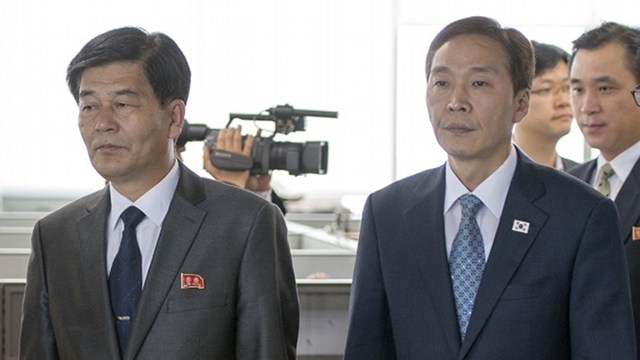SUMMARY
This is AI generated summarization, which may have errors. For context, always refer to the full article.

SEOUL, South Korea – Talks between North and South Korea about reopening their jointly-run industrial zone collapsed Thursday, July 25, with both sides failing to set a date for another meeting.
The two sides blamed each other for what the North called a “virtual breakdown” of the talks aimed at reviving the Seoul-funded Kaesong industrial estate in the North.
“It is very regrettable that the North has declared the talks had in effect collapsed,” said Kim Hyung-Suk, spokesman for the South’s Unification Ministry.
“Judging from the results of today’s talks, the government finds the fate of the Kaesong zone is in serious danger,” he said.
Earlier the North’s chief delegate Pak Chol-Su warned that the North may turn the estate into a military base if the talks collapsed.
“If the fate of Kaesong industrial zone ends like this, the military would reclaim it,” he said.
North Korea had relocated its military facilities in order to make room for the zone, which opened in 2004.
Officials from both sides had previously met 5 times this month but failed to narrow differences on rescuing the last symbol of reconciliation.
Work stopped there in April after military tensions increased.
Some analysts saw Thursday’s talks as the last chance to salvage Kaesong, saying friction was likely to rise again next month when the South holds an annual military exercise with the US.
Details of the Ulji Freedom Guardian exercise have not been announced, but the drill usually begins in the middle of August and lasts for 10 days, involving tens of thousands of US and South Korean troops.
Finger-pointing
Rodong Sinmun, newspaper of the North’s ruling party, said Sunday the exercise would create an “uncontrollable” crisis on the Korean peninsula.
“Unfortunately, the Kaesong estate is now heading for a permanent shutdown,” Professor Yang Moo-Jin of Seoul’s University of North Korean Studies told AFP.
“Confrontation between the two rivals will intensify and military tensions on the Korean peninsula will rise further.”
Production at the Kaesong estate, 10 kilometers (6 miles) over the border, has been suspended since North Korea withdrew its 53,000 workers from the South’s 123 factories in April.
Talks on reopening it have been dominated by mutual recriminations over who was to blame for the shutdown.
The South wants North Korea to accept responsibility and give a written guarantee that it will never happen again.
The North says it was not responsible for the shutdown, arguing that its hand was forced by hostile South Korean actions and intimidation — in particular, a series of joint military exercises with the United States.
Professor Koh Yu-Hwan of Seoul’s Dongguk University said the North saw the South’s demand that it take full responsibility for the suspension of Kaesong as an affront to its national pride.
“The North is likely to create a crisis with some military provocations,” Koh said.
Kaesong, born out of the “sunshine” reconciliation policy initiated in the late 1990s by then-South Korean president Kim Dae-Jung, was an important hard currency source for the impoverished North through taxes, other revenues, and its cut of workers ‘ wages.
The joint complex, which had survived previous cross-border crises, was the most high-profile casualty of two months of elevated tensions that followed a nuclear test by the North in February which sparked international condemnation.
South Korean managers say they have suffered production losses of around $1 billion, and have criticized the two sides for making a political football of their businesses.
Some have threatened to pull out of the complex permanently unless operations resume soon. – Rappler.com
Add a comment
How does this make you feel?
There are no comments yet. Add your comment to start the conversation.